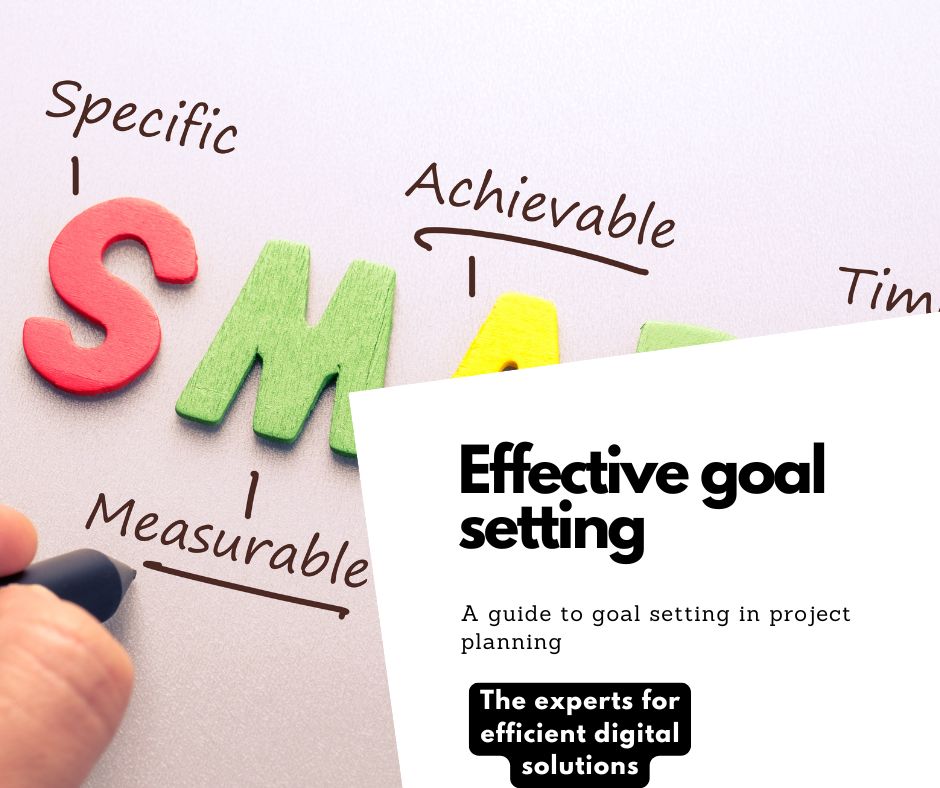SMART criteria: A guide to goal setting in project planning

The ability to set clear and achievable goals is critical to the success of any project. The SMART criteria(Specific, Measurable, Achievable, Realistic, and Timely ) provide a proven framework to ensure that your goals are specific, measurable, achievable, relevant and time-bound. In this article, we explain how you can effectively apply SMART criteria to your project planning and provide concrete examples and quotes from project stakeholders.
Specific
A clearly defined project goal is the first step towards effective communication. Before the team starts work, it should be ensured that all members understand the project objectives and can align themselves with them.
A specific goal answers the questions “What?”, “Who?” and “Why?”. It is important that the objective is formulated clearly and unambiguously so that everyone involved understands exactly what is to be achieved.
Example:
Instead of saying “We want to improve customer satisfaction”, formulate the goal more specifically: “We want to increase customer satisfaction by 20% by the end of the quarter by introducing a new support system.”
Quote: “Specifying our goals helped us to clearly communicate expectations and define responsibilities,” explains Anna – Project Manager Digital Platforms


Measurable
In order to track progress and evaluate success, the goals must be measurable. Define clear metrics that help you to recognize whether the goal has been achieved.
Example:
In the previous example, the measurable criterion could be: “We will measure customer satisfaction with a survey conducted after a support ticket has been closed.”
Tip: Use quantitative and qualitative metrics to get a comprehensive picture of progress.
Accessible
Set realistic and achievable goals. Take into account the available resources, the time frame and the skills of the team. Unrealistic goals often lead to frustration and demotivation.
Example:
Instead of saying “We want to acquire 1,000 new customers within one month”, rephrase the goal: “We want to acquire 300 new customers within three months by carrying out targeted marketing campaigns.”
Quote: “It’s important that our goals are challenging, but also achievable. Otherwise we lose motivation,” emphasizes Mark, Digital Project Manager.


Relevant
The goals must be relevant to your project and the overall strategy of your company. Think about how the goal contributes to achieving the long-term vision.
Example:
A relevant goal could be: “We want to increase our digital reach in order to raise brand awareness and increase sales by 15 %.”
Tip: Make sure that the goals you set are in line with the company’s objectives and market strategy.
Time bound
Each goal should have a clear time frame in which it is to be achieved. This promotes urgency and helps you to monitor progress.
Example:
“We want to increase customer satisfaction by 20% within the next six months in order to be ready in time for the peak season.”
Quote: “Setting deadlines has helped us to stay focused and ensure that we achieve our goals on time,” explains Laura – Digital Product Manager.


The SMART criteria are an effective approach to defining requirements more clearly and comprehensibly. They help us to set precise and achievable goals that both motivate our team and serve the company’s strategic objectives. This structured approach allows us to achieve success quickly and efficiently with targeted adjustments.
Till Neitzke
Conclusion: SMART criteria
The SMART criteria are an effective tool for setting goals in project planning. By applying these criteria, you can ensure that your goals are clear, measurable, achievable, relevant and time-bound. This structured approach not only helps you to focus on the most important tasks, but also to increase your team’s motivation and ultimately maximize your projects’ chances of success. By integrating the SMART criteria into your project planning, you lay the foundation for sustainable success.

Successful together in the digital transformation –
Your introductory meeting with DMG
In our introductory meeting we will discuss
- what your current challenges are in digital projects
- how other companies have done it and how you can use this to your advantage.
- what needs to be done now and whether we are the right people for the job.
[ameliastepbooking]
